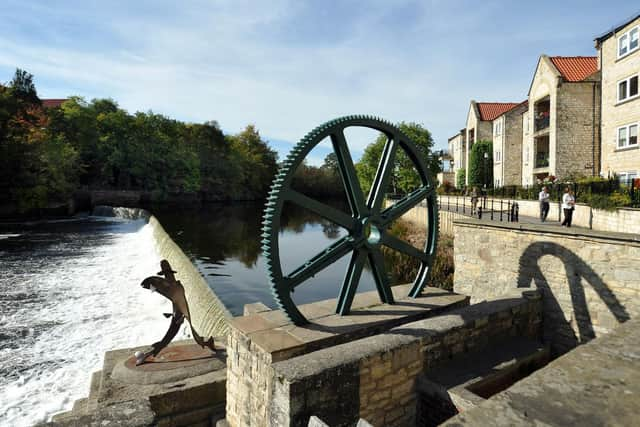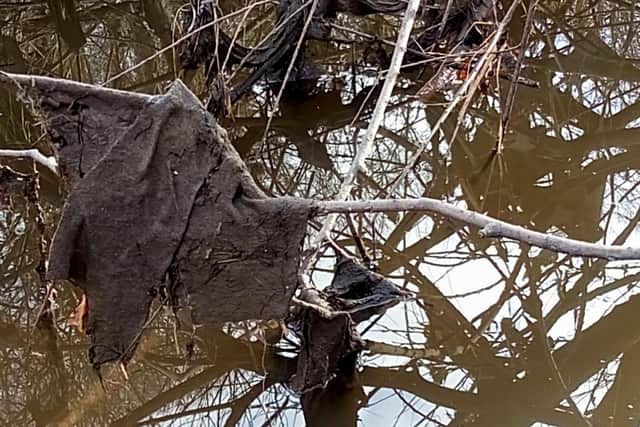Underwater photographer captures images of 'disgusting' human waste in the River Wharfe
Mark Barrow, a Leeds-based photographer who runs the Beneath British Waters social media channel, has spent three decades filming below the surface of the river and says the lockdown summer has been the worst year he can remember for littering and pollution in the water.
He recently published a clip of a used sanitary towel drifting in the Wharfe near Wetherby, and has also seen parents throw their children's nappies into the river and observed pile-ups of 'thousands' of wet wipes, as well as plastic waste.
Advertisement
Hide AdAdvertisement
Hide AdMr Barrow's footage has been promoted by the Ilkley Clean River Group, whose members are campaigning for a stretch of the Wharfe at Ilkley to receive government designation as bathing water, meaning it would have to be legally monitored by the Environment Agency.
He has questioned whether screening facilities at the Wetherby sewage plant designed to sift out waste are effective enough, and also claims to have witnessed 'storm discharges' of raw sewage into the river - which are legally permitted to prevent flooding during extreme weather - at times when rainfall has been 'minimal'.
"I've spent 30 years diving and filming in rivers across the UK. I knew sewage was an issue in the Wharfe, so I went up to Ilkley about three years ago. I touched what I thought was a wall of silt, and when I surfaced I realised it was a full-on sewage discharge. I was covered in every sort of human waste you can imagine.
"It gives me a unique insight I think. It's not until you look under the surface that you realise how bad the pollution is. A lot of it goes unnoticed.


Advertisement
Hide AdAdvertisement
Hide Ad"Ilkley had it bad, at Wetherby it's sometimes drifting from further upstream - every river nationwide is like this.
"I've filmed storm discharges at Wetherby when the rainfall has been minimal. There have been about 30 this year - have there been 30 extreme weather events? I don't think so."
He has even come across dangerous discarded items such as weedkiller bottles and hypodermic needles.
"During lockdown, nature really didn't miss us. Since restrictions were lifted, I've seen so much more plastic waste. People visiting the countryside have just been discarding stuff. I've seen parents chuck used nappies straight into the river. It's been the worst year so far, by a long way."


Advertisement
Hide AdAdvertisement
Hide AdMr Barrow has been working with Leeds City Council to reduce pollution incidents at Wetherby, and was invited by Yorkshire Water to tour the sewage treatment facility.
"They told the deputation that things like wet wipes and condoms are screened out, but I've seen piles of wipes as far as the eye can see before. It's shocking. People are treating the river like a public toilet."
A spokesperson for Yorkshire Water said: "All sewage is screened for wet wipes and other foreign objects when it comes into the sewage works - although, unfortunately, due to the high volume of items that are flushed, debris can occasionally get through the gaps.
"We recently cross-checked all dates when high sewage flows were seen against rainfall readings for Wetherby, and on every occasion there was rainfall recorded. This confirms that the high flows received at the works are directly related to rainfall and are within EA regulations. Due to the size of the network and the catchment’s topography, increased flows can continue for some time after rain has stopped."
The battle to clean up the Wharfe at Ilkley
Advertisement
Hide AdAdvertisement
Hide AdMr Barrow's discoveries are grist to the mill of campaigners who have been lobbying DEFRA to grant bathing water status to the Wharfe at Ilkley, which would make it the first river in the country to be classified as such.
If the government gives the Wharfe official designation as being suitable for swimming, it would mean the Environment Agency would have to regularly test the water for the presence of harmful bacteria such as E.coli.
The Ilkley Clean River Group believe that bacteria levels rise when rainfall overwhelms the Addingham sewage pumping station's storm tanks, causing untreated effluent to enter the river. These discharges are legal in order to prevent leakages into people's homes, and are often permitted by the Environment Agency.
Bradford Council have backed the group's submitted application to DEFRA. If granted, the Environment Agency would be required to conduct weekly testing during summer and issue pollution risk forecasts, as well as investigating the source of any pollution detected and taking enforcement action.
Advertisement
Hide AdAdvertisement
Hide AdThe campaigners must convince DEFRA that there is high demand for swimming. Last summer, Ilkley Clean River Group monitored activity at the site and found that on several hot days, more than 1,000 people entered the water. This summer, the pebble beaches have been even more popular since lockdown travel restrictions were imposed.
They want a 300-metre stretch from Ilkley Old Bridge to Beanlands Island to be covered by the protection.
Their grassroots activism has uncovered 'regular and routine' sewage dumping in the Wharfe by Yorkshire Water with the Environment Agency's consent. Several members of the group are retired scientists who conducted 'citizen testing' themselves.
Between April and December 2019, there were 136 instances when sewage was discharged into the river.
Advertisement
Hide AdAdvertisement
Hide AdThe campaigners have argued that the poor water quality could also impact upon fish and other species living in the Wharfe.
Ilkley resident and campaigner Professor Rebecca Malby believes the group have uncovered a 'national scandal' and exposed the poor maintenance of outdated sewage systems.
"We first started noticing the discharges from the storm overflow pipe about a year ago, and fishermen were also telling us that fish stocks were depleted. The overflows happen after anything more than a little bit of rain.
"The water companies basically have a licence just to dump sewage. If the water is higher than a certain level, they say sewage could back up and flow into people's houses. We say they need to set the limit higher and upgrade the plant.
Advertisement
Hide AdAdvertisement
Hide Ad"It is happening a few times every week. We accept it will happen in exceptional weather conditions, but not day-to-day.
"The legislation (on sewage discharge) is imposed by the EU but it is very loosely interpreted here. If anything, after Brexit it could be tightened up."
The group has made a 'citizens' application' for bathing water status to DEFRA with the support of Bradford Council and Ilkley Town Council. It has now reached the consultation stage following lockdown-related delays.
"There are often over 1,000 people swimming and paddling in the river on nice summer days - it's fine in dry conditions but the E.coli levels can be 40-50 times the safe limit after rainfall. Children are playing in that water.
Advertisement
Hide AdAdvertisement
Hide Ad"Fish numbers are declining and the water is not fit to support the ecosystem. It's a first world country and you can see this brown sludge heading up the river.
"Nobody has tried to get a river designated before. We have a fantastic team of scientists who are based locally, they have monitored and tested the water and we know it is not farm run-off - it is coming from the sewage works.
"It's happening everywhere, it's not just in Ilkley. The system isn't fit for purpose. We have manholes spewing sewage, but the water companies have walked a slow walk with improvements."
A spokesperson for Yorkshire Water said:-
"We continue to have a constructive relationship with the Ilkley Clean River group and support their application to achieve bathing water designation for the River Wharfe, which would make it the first inland bathing water in the country.
Advertisement
Hide AdAdvertisement
Hide Ad“If achieved, we, like other stakeholders would need to make changes to maintain the designation. This would focus on the capacity of the combined sewer network which has been designed to deal with both foul and surface water.”
Comment Guidelines
National World encourages reader discussion on our stories. User feedback, insights and back-and-forth exchanges add a rich layer of context to reporting. Please review our Community Guidelines before commenting.